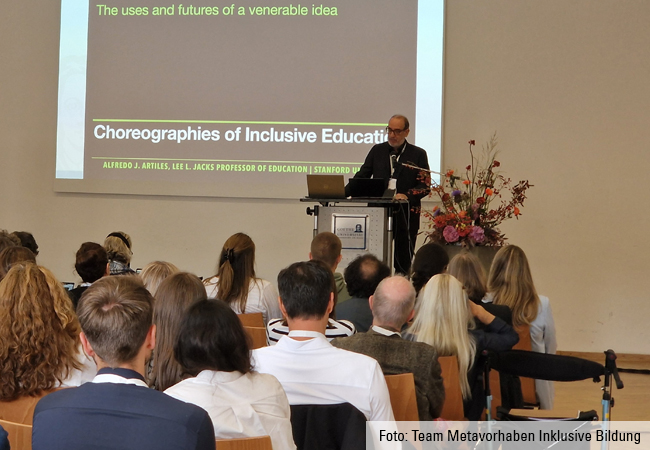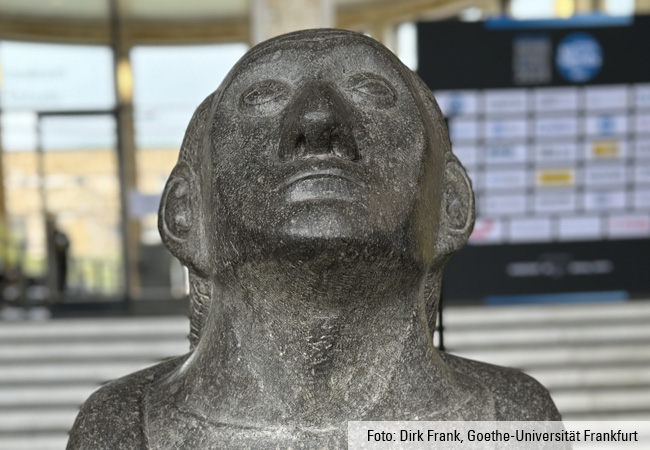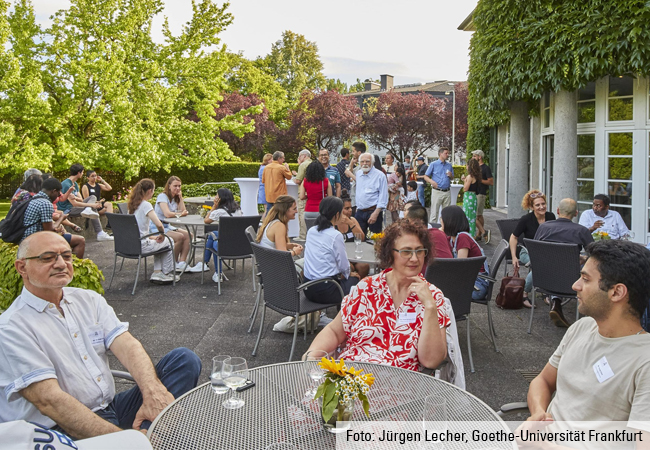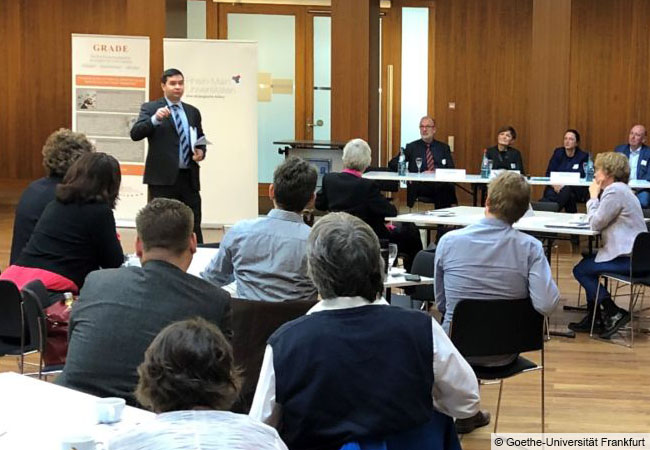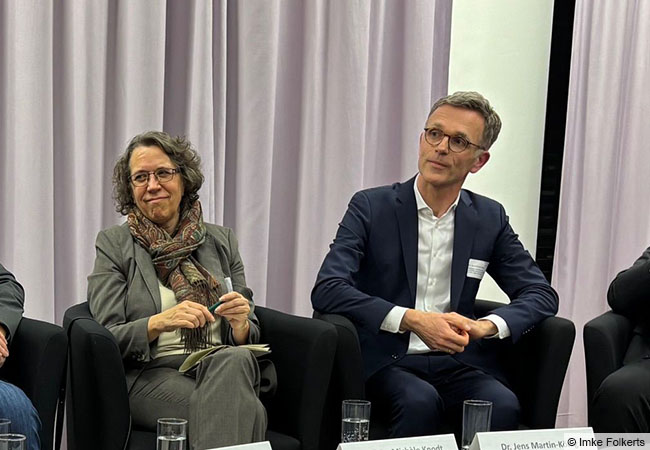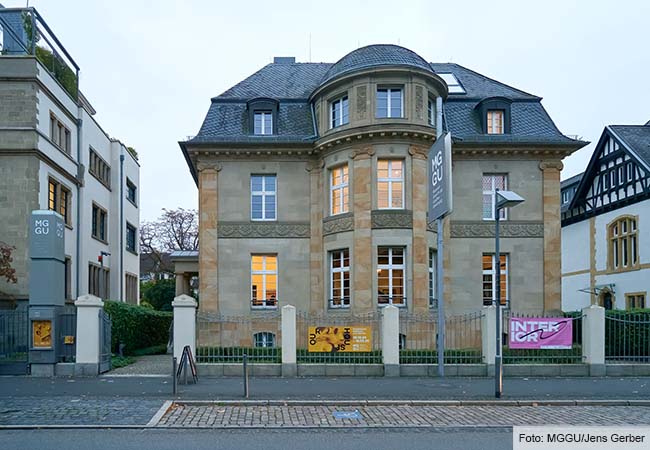Laudatio for Professor Bertram Schefold
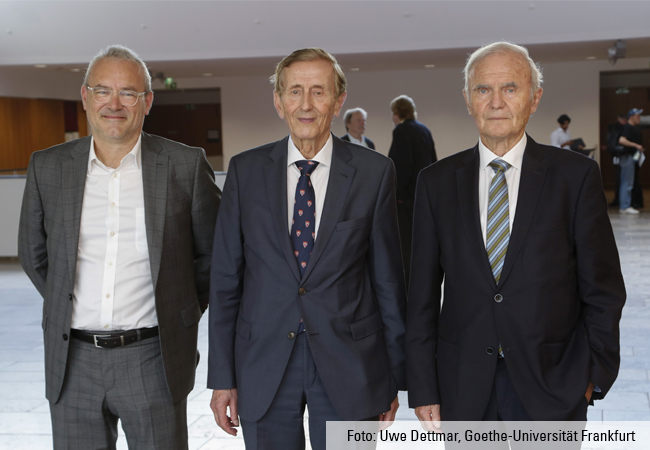
For me, writing a laudatio for Bertram Schefold is not an easy task. Where do I start? Where do I stop? After all, I have known him since he was called to the chair in 1974, when I heard his first lectures on “Ricardo, Keynes, Marx” and an introduction to Sraffa’s model, half of which was an introduction to the theory of non-negative matrices. And so, for me, too, that means 100 semesters, or rather 50 years, in which we have come to know each other, and he has had a significant influence on my academic socialization.
First of all, we need to pause for a moment and call to mind the duration of his teaching and research career: 1974 to 2024. As an economist, I remember the first and second oil crises, the inflation that followed, which incidentally lasted a long time and only eased at the end of the 1980s, the nuclear power debate, German reunification, the introduction of the euro, the 2009 financial crisis and, most recently, the coronavirus pandemic, and the wars in Ukraine and Palestine. Apart from the financial crisis, they were all exogenous shocks that the economy and society have had to manage and which called for a readiness to adjust.
Economic theory: embedded in history and checked for logical consistency
But back to the Bertram Schefold. I would like first to touch on two aspects already intimated by the title of the symposium “Never Without Mathematics And History”. At the heart of Bertram Schefold’s research and teaching are various approaches to economic theory, which he subjects, on the one hand, to conceptual and mathematical scrutiny and whose development he reconstructs. On the other hand, he compares these theoretical approaches with findings from economic history research. In a nutshell: For him, economic theory that is not embedded in history and not checked for logical consistency is nothing more than half-knowledge.
He is particularly interested in laying bare the inner logic of economic activity in different periods of economic development and how it is reflected in economic thought. More recently, he has also made the opposite perspective a subject of discussion, that is, the influence of economic thought on real economic development. In this context, he can be viewed as one of the few protagonists of the co-evolutionary approach in the history of economic thought. The “heroic tale” dominates, which implicitly posits that there has been a linear development from the beginnings up to contemporary theory, in which the wrong has been eliminated and the right has been preserved. Those economists who have made a lasting contribution are the heroes.
The symposium’s program mirrors Bertram Schefold’s research areas. Heinz Kurz (Graz), the editor of Piero Sraffa’s scientific legacy, spoke “On Plato and the truth as a constant quest and never a safe possession, using the example of Bertram Schefold’s work on Sraffa and capital theory”. The mathematician Götz Kersting (Faculty of Computer Science and Mathematics), who has published together with Bertram Schefold, spoke about “Randomness matters” and explained to the audience, among other things, how “random matrices” came to be applied in physics. After the coffee break, Werner Plumpe (Faculty of Philosophy and History) presented the latest research findings on the question “Why are some people rich and others poor?”. A topic that has led to fierce controversy between the California School and the proponents of the Eurocentric approach in both economic history research and growth studies for over twenty years. Last but not least, André Lapidus (Paris), who like Bertram Schefold is Honorary President of the European Society for the History of Economic Thought, gave a lecture on “The Rise of the Classical Usury Paradigm: From Thomas Aquinas to Hugo Grotius”.
A private celebration held for Bertold Schefold at the Gesellschaft für Handel, Industrie und Wissenschaft concluded the day, to which guests from the faculty and other colleagues close to him were invited, alongside family members. After a piano concert by Viviane Goergen, the culinary part of the celebrations began, which was punctuated by notable speeches, for example by Gerald Braunberger, the editor of the FAZ newspaper, economist and alumnus of the Faculty of Economics and Business, and the physicist Professor Dieter Imboden (ETH Zurich), who has been friends with Bertram Schefold since their student days in Basel and recalled their mountain hikes together and surfing downstream of the old Rhine bridge. I should also mention the magnificent toast made by Martin Mosebach, who highlighted the literary aspects of Bertram Schefold’s work, in particular his services to the Stefan George Society and the museum in Bingen, George’s native town.
Clarity and precision
Coming back to the history of economic theory. It should only be mentioned in passing here that knowledge of the languages dominant at the time, above all Latin and Ancient Greek, is not detrimental to the study of the history of theory and that it is necessary to be au fait with the conceptual worlds of these cultures. I remember how we assistants sat together to proofread an essay by Bertram Schefold on “Reflections of Ancient Economic Thought in Greek Poetry” and compared the proofs with the ready-for-press manuscript. We spotted certain differences and duly noted them in the margin. My printed copy still contains a small note from the publishers: “Errata – Due to a typographical error, the spiritus aspers in conjunction with an apex on initial vowels were changed to a diaeresis.” So much for the educational experiences of young economists when proofreading. Overall, Bertram Schefold introduced Cambridge traditions – supervision – into teaching. We assistants were trained, Cambridge-style, in “reasoning in the armchair” over afternoon tea. We reflected on a theoretical or economic policy problem, on occasion with a blackboard and chalk, so that the tea sometimes went cold. In the lecture hall, clarity and precision were and are typical of his presentation style. Mathematical derivations and proof followed the economic narratives and problems presented at the beginning; mathematics never appeared to be an end in itself. Highlights in his teaching were always his seminars, which until recently took place on a regular basis in summer and winter during Seminar Week at the university’s study center in Riezlern. They often led to heated discussions that continued deep into the night and, after a brief nap, at the breakfast table the next morning. It can justifiably be said that Bertram Schefold lit a fire for many of his students and academic disciples rather than filling a pail. For many of those I know personally, it has never gone out, even if everyone has, of course, filled their own pail quite differently. That, too, is a lasting merit of his liberality. Not entirely unselfishly, I hope, also on behalf of his many students, that he retains his unbroken and infectious vitality for a long time to come!
Professor Volker Caspari, Senior Professor of Economics, Goethe University Frankfurt


